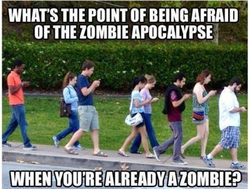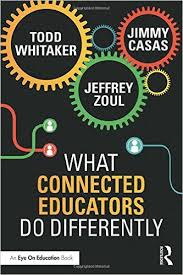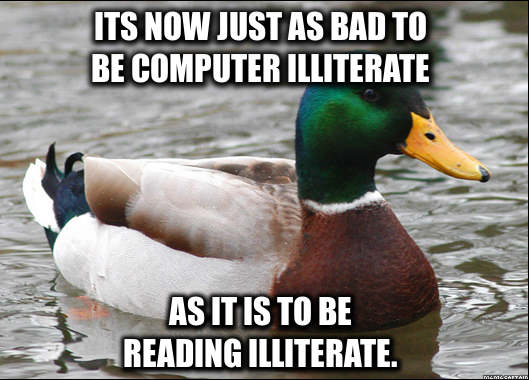|
How did I use tech this holiday? Since we are far from home here in Nebraska, I sent video and pictures, of course! I also sent video and pics of the festivities of Friday's classes. I guess in short, this is one of the main reasons I love technology.  Some will argue that tech divides us and turns us into an army of digitalized zombies.  I assert that tech brings us closer together as a community and as a family. As proof, I offer this picture that I took in traffic on Wednesday in Papillion, Nebraska, and immediately sent to my family and friends on my phone. Within minutes, all my friends as far away as the U.K., Egypt and Korea saw this crazy turkey and we shared a laugh. Tech has the ability to divide us, but also to bring us together to share the common (or not so common) experiences of life. And I, for one, am thankful.
0 Comments
:If you know me, and I dare say you do if you are on this website, you know that I can be a bit of a feather-head/typical blonde/ flighty/ hot Southern mess (I have a t-shrit that says so). On that note, I was reviewing some of my BTC duties and realized that I never address the topic I was supposed to address in the first blog post. My self-centered, egotistical brain just decided to talk about me and MY feelings. Or, in the immortal words of Jennifer Saunders: Well, being absolutely fabulous aside, I do need to address the issue of contentedness and the topic for the BTC's which was to write a refletion upon reading @ToddWhitaker, @Jeff_Zoul (Roll Tide!), and @casas_Jimmy's book #WhatConnectedEducatorsDoDifferently. I'll be honest. I HATE reading educational books; however, I have to admit that some of this book is really useful for educators trying to be connected. It is a very different mindset, but one that has been coming in education for a long time. I know if you are an educator, you've encountered that teacher who had some really GREAT stuff, but absolutely refused to share any of it! It was like they thought that the resource made them a good teacher and if you took the resource they would cease to be so awesome. I guess we are all guilty of "closing out doors" and doing what we need to do to get our scores (and let's face it, at the end of the day, it's how we are judged as "proficient.") This book focuses on how to change all that "closed-ness." It's about opening up and sharing all our resources in the name of growth and student potential and out right fabulousness. What Connected Educators Do Differently does this by harnessing the power of twitter by educators to connect and share and promote.. According to the authors, twitter opens those closed doors and encourages a growth mindset among educators. And after using it for just a few months, I can definitely see the benefits. It's kind of like coming home to a place that teachers can share resources freely and openly question peers on what they are doing and how they are doing it, Although this requires an initial paradigm shift (what, brag about what I do?!?), it's very beneficial to have a space where ideas for lesson grow on trees (figuratively) and new ideas spring from the feed virtually every few seconds (literally). It's worth the cost of the book, just to get the education super star list to follow! Anyway, check it out if you're interested. Oh, and follow them (and ME @SanthaWalters) on twitter.
I am literally buzzing. And it's not the coffee (Okay, it might be the coffee a little bit).
Last night I went to the University of Nebraska at Omaha's campus and attended the monthly meeting of the Computer Science Teachers of America (CSTA). Derek Babb had cordially invited teachers to attend to learn about upcoming the Hour of Code opportunities. I was blown away with all the support and ideas and resources presented! I want to summarize a few of them here both for myself and any other teachers interested in computer science in the classroom and Hour of Code. Most impressive facts: One million jobs in IT are expected to be created in the next five years ( !!!!). There are students writing programs to measure the atmosphere for weather balloons that can rise 20 miles over the surface of the earth. Students! Now, for the goodie. The site resources: US Cyber Patriots is a great way for kids to become involved in system administrative work to secure websites and fight black hat hackers. The have competitions for kids from high school to elementary school! It's perfect for middle school kids (heck, all kids). HelpGidget is an awesome lower level site for kids to experiment with code. Although it is rather elementary for most middle school students, I can definitely see applications with our modified SPeD population. MIT App Inventor for those more advanced students who are ready for the next level. This has tutorials and videos AND lesson plans and forums for those tougher app type problems. Code Combat Which for the life of me looks like Clash of Clans or some other "warrior" video game. The guys are going to love this one! Also, this website can accommodate a teacher account so the students don't have to login or make accounts. Code School This site has free and pay lessons. The students just need to be sure they log into the free ones. It's kind of sneaky because it has students take the first course for free and then has pay courses for ones that follow. So much like a neighborhood drug dealer, it gets you hooked with free product and then charges. Code Academy has an interesting premise. Students complete courses and are rewarded with Donor's Choose gift cards. They can literally learn code and then earn money to buy their clubs supplies! This blew my mind. What a great incentive especially for those of us trying to start our own clubs without resources. Coding Bat makes old school cool again. This website looks like something out of DOS 1.0; however, it has some nice meat on the bones. Students can watch videos and practice "warmups' to hone their skills. These come in the way of challenges for the student to solve. Once you get past the old school appearance, it really does the trick to move students from blocks of code (like in Scratch and Snap) to strings of actual code phrases. picoCTF is a "capture the flag" type challenge site that is GLOBAL. Student teams from around the world compete to solve cyber challenges.. Here's their blurb witch does a better job than I ever could to explain it. "PICOCTF is a computer security game targeted at middle and high school students. The game consists of a series of challenges centered around a unique storyline where participants must reverse engineer, break, hack, decrypt, or do whatever it takes to solve the challenge. The challenges are all set up with the intent of being hacked, making it an excellent, legal way to get hands-on experience." --picoCTF website--November 10, 2015 CTFtime.org works along the same lines as picoCTF where students compete globally to solve cyber problems in real life scenario based situations. Okay, I'm not even touching on Tickle, Sphero, Hummingbird, Ozobots or Maky Maky's that we got to in the second hour thirty minutes (YES, the second thirty minutes!!) And, they served us pizza. Really, what's not to like? Pizza, tech, great leadership and amazing ideas all in a compact and easy to navigate environment. Please, please, please give your local chapter of CSTA a chance if you are into this stuff. I cannot believe the positive and supportive environment was right down the street at UNO all this time! I am thrilled to finally be plugged into this VALUABLE community. Now, please excuse me. I've got some coding websites to play, uh, work with. S.W. So, I added some of the apps into Schoology yesterday and was completely aghast with how well they integrated. Of course, being the new tweeter/teacher that I am, I had to hit up twitter about it and they retweeted me!!
Honestly, this is one of the best learning platforms I have come across in teaching--and this is from a woman who still has her Quia account active!! Anyway, it's cool it was picked up. So, this is my first blog post. I am doing this as a part of my training and position as the Building Technology Coordinator for Logan Middle School, but truth be told, I've wanted to do it for a while now. I'm thankful to my 'handlers' in the tech center for forcing my hand on this one. I've posted this to twitter, but I think the majority of teachers (especially in the language arts fields) do not understand how important computer literacy is in this day and age. When I met people who are computer illiterate, I am mostly astounded and then I'm curious about why. Why would you choose a limited life? It is becoming so that even "low-tech" jobs are requiring a higher and higher degree of technology.
When I worked at Delphi Harrison as their education liaison for Shelton State Community College, I discovered that the difference between being a manager and a worker was the ability to write. I'm wondering if that's the direction of the future with technology. If that is the case, how does that and how should it affect education in our country? I think the ability to adapt to software and work within platforms will be essential knowledge for any workers who wish to succeed. |
Archives
April 2024
Categories |
 RSS Feed
RSS Feed





